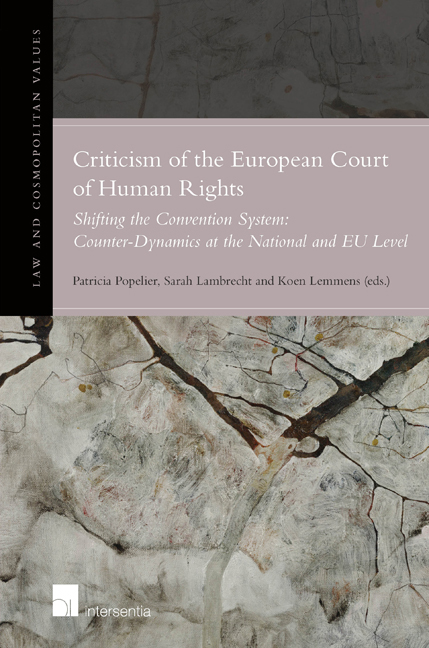 Criticism of the European Court of Human Rights
Criticism of the European Court of Human Rights from PART II - SPARSE CRITICISM
Published online by Cambridge University Press: 13 December 2017
CRITICISM OF THE EUROPEAN COURT OF HUMAN RIGHTS
In Germany, the system of the European Convention on Human Rights and the European Court of Human Rights are not subject of widespread or fundamental criticism. The Convention system is not generally debated on. Mass media reports rather rarely on the Convention system or the European Court of Human Rights as such. The reform process is not a matter of general interest, and information about the reform process can only be found sporadically in the mass media.
Mass media reported on a couple of specific judgments of the European Court of Human Rights which touched sensitive questions such as religious freedom, the rights of homosexuals regarding marriage or the adoption of children or the decision to end life-sustaining measures. Sometimes, specific judgments concerning Germany lead to criticism, mainly by academia. This can be focused on the outcome of individual cases but also on the reasoning of the judgment itself or its consequences for the national legal order or influence on the national jurisprudence. However, the criticism regarding individual cases does not lead to hostile attitude against the European Court of Human Rights or the Convention system.
COUNTER-DYNAMICS AT THE POLITICAL LEVEL
POLITICS AND THE CONVENTION SYSTEM
In the following, an analysis of the election programmes of the main political parties in the political scene in Germany is provided in order to give an impression of the political positions held vis-a-vis the protection of fundamental rights and freedoms by the Convention system. As it is the most recent source, the analysis is founded on the election programmes presented before the nationwide parliamentary election in September 2013. After the election in 2013 the political parties “Christlich Demokratische Union Deutschland”/”Christlich Soziale Union Deutschland” (CDU/CSU) entered into a coalition with the “Sozialdemokratische Partei Deutschland” (SPD) forming a so called “Große Koalition” (large coalition). By this, the former coalition consisting of the CDU/ CSU and the “Freie Demokratische Partei” (FDP) had been replaced.
The government programme of the party CDU/CSU mentioned the European Convention on Human Rights and the European Court of Human Rights explicitly, but only at one occasion and very shortly. It proclaims that any attempt to weaken the Court has to be prevented.
To save this book to your Kindle, first ensure no-reply@cambridge.org is added to your Approved Personal Document E-mail List under your Personal Document Settings on the Manage Your Content and Devices page of your Amazon account. Then enter the ‘name’ part of your Kindle email address below. Find out more about saving to your Kindle.
Note you can select to save to either the @free.kindle.com or @kindle.com variations. ‘@free.kindle.com’ emails are free but can only be saved to your device when it is connected to wi-fi. ‘@kindle.com’ emails can be delivered even when you are not connected to wi-fi, but note that service fees apply.
Find out more about the Kindle Personal Document Service.
To save content items to your account, please confirm that you agree to abide by our usage policies. If this is the first time you use this feature, you will be asked to authorise Cambridge Core to connect with your account. Find out more about saving content to Dropbox.
To save content items to your account, please confirm that you agree to abide by our usage policies. If this is the first time you use this feature, you will be asked to authorise Cambridge Core to connect with your account. Find out more about saving content to Google Drive.